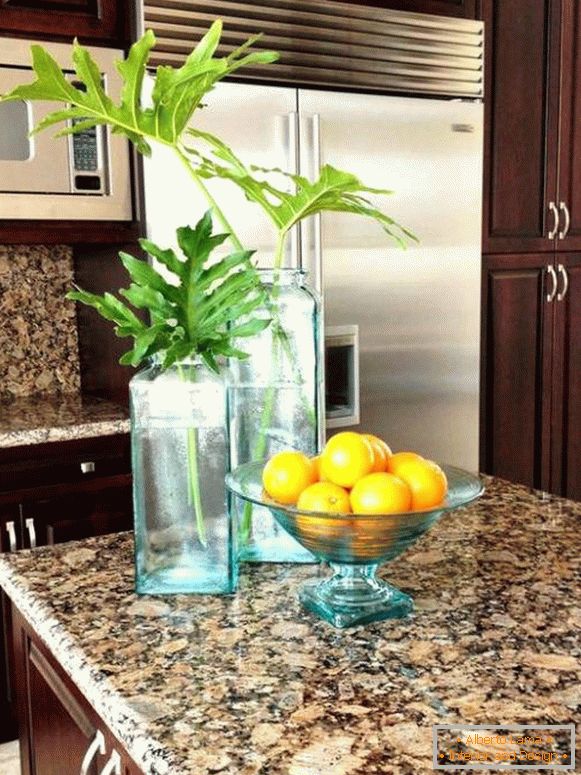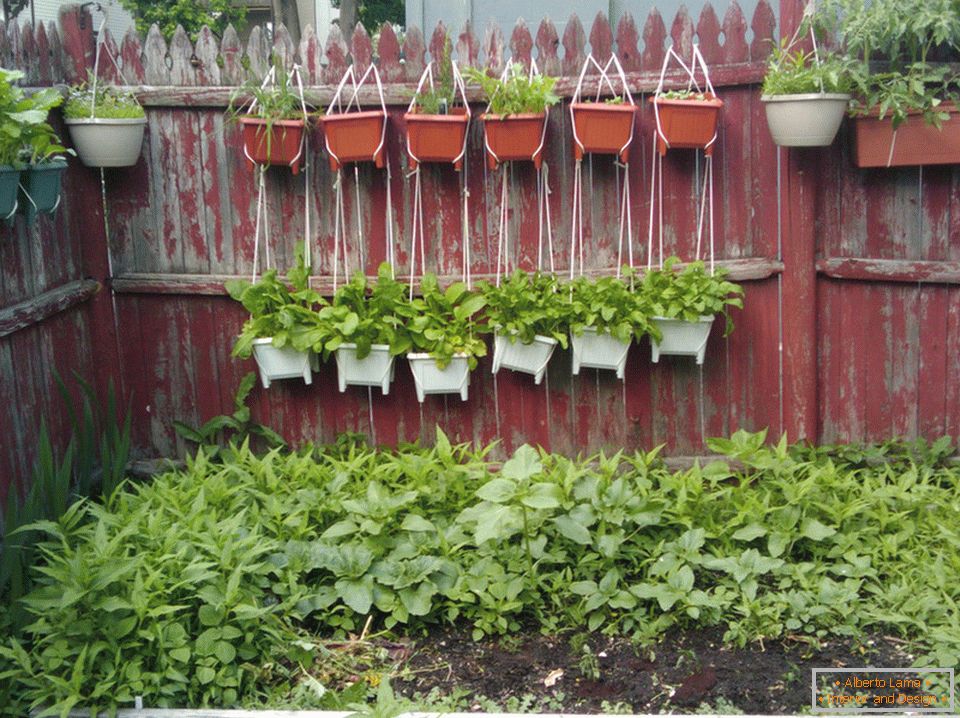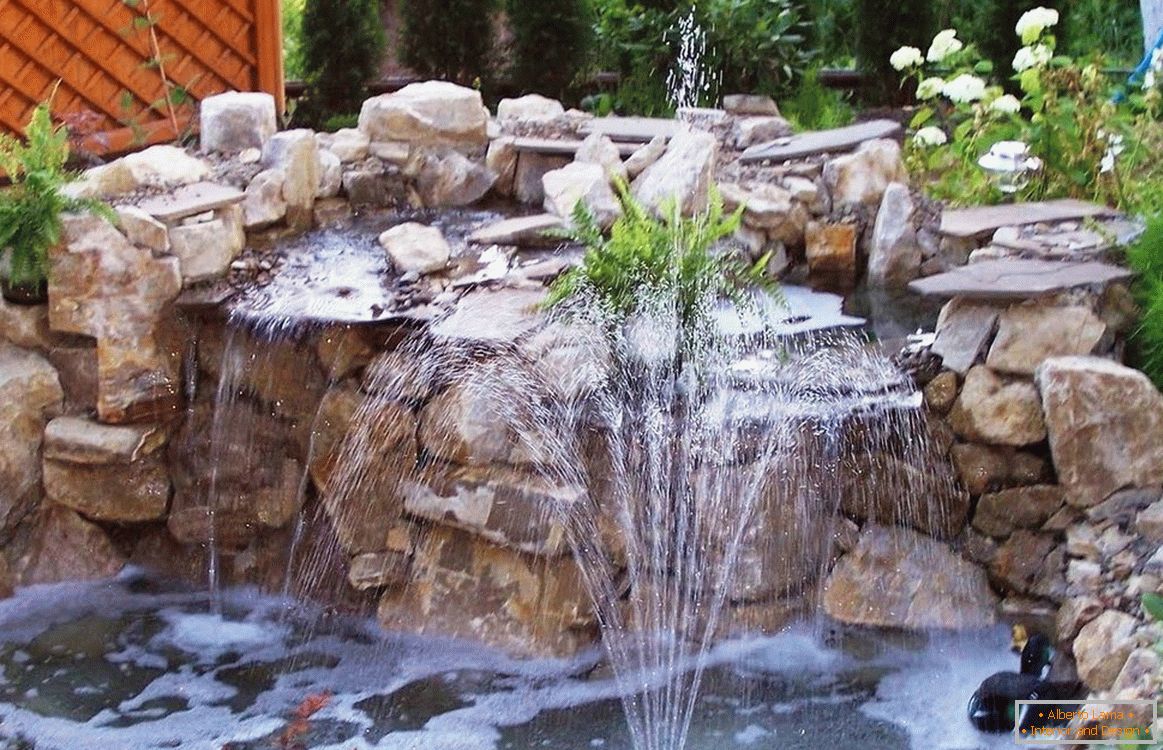
Waterfalls have always captivated people with their beauty. Observation of the movement of water pacifies, calms and tends to philosophical reflections. In Japan, no garden can not do without this decorative element, and as you know, the people of the east are recognized aesthetes and connoisseurs of beauty. Decorative waterfall can be independently designed and installed in your garden. He originally fits into the landscape composition and becomes its center, to which other elements of design gravitate. More miniature versions are placed even in living rooms, so the framework for this decorative object simply does not exist: it can be adapted everywhere. As a matter of fact it is a design with constantly circulating water, the closed cycle of which is provided by the built-in pump. We will try to find out the details of the creation of waterfalls, the equipment necessary for their operation and the features of the installation.
Any of the above types can be reproduced in your garden, at the cottage or in an apartment. In this case, the role is played only by the surface over which water will flow. From its shape and shape depends the general appearance of the finished composition. There is also another classification according to the nature of the water flow:
| Drip | In these waterfalls, special glass tubes are used, through which the water flows down gently. This option is closest to the natural original. |
| Inkjet | Water flows in a continuous stream, which is partially dissected by artificial obstacles. |
| Mirror | For this design, a layer of glass is needed on which water will collect in droplets and fall down. The design creates the illusion of rain. |
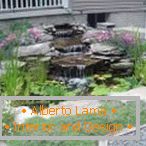
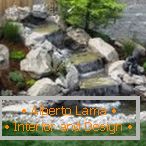
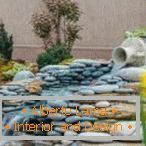
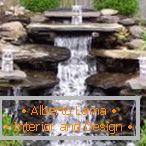

As a material for the substrate, on which water is selected:
- Glass;
- Mirrors (the original effect of doubling the flow);
- Artificial and natural stone;
- Ceramics;
- Wood (will have to change over time due to susceptibility to rot in conditions of high humidity);
- Metal;
- Combined compositions.
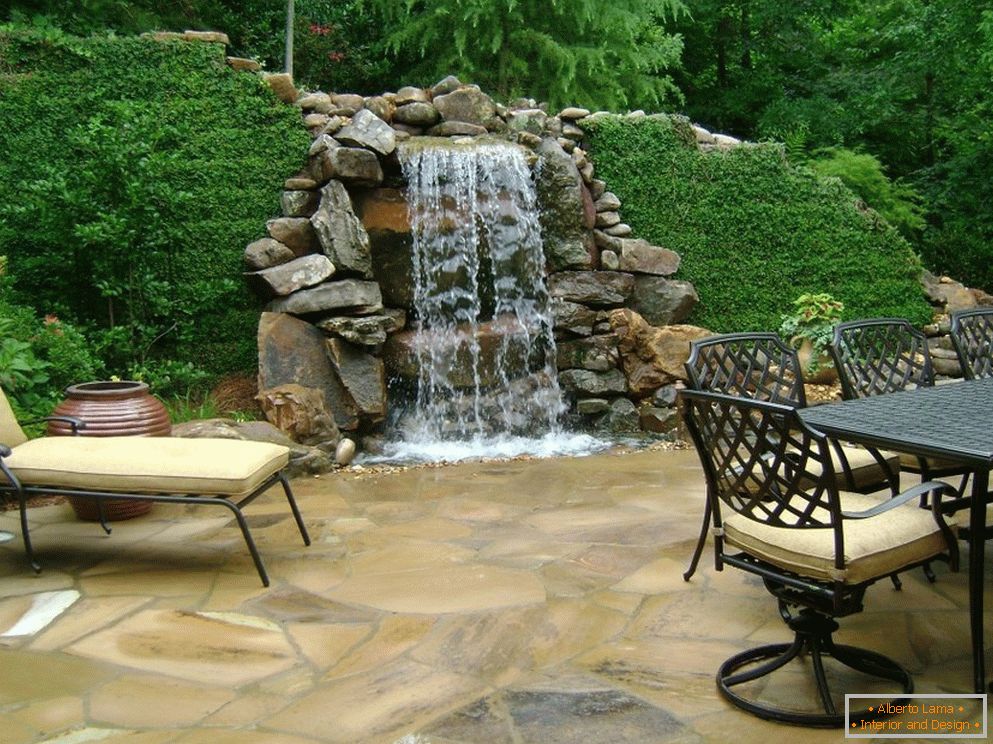
In the jet versions, the nature of the flow of water will depend on the texture of the surface. To get thin threads choose rough stones with numerous notches. Preference is given to polished surfaces to create a smooth and smooth flow. To water froth at the point of incidence, next to it are placed several stones, which it will "break".
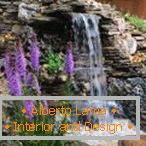
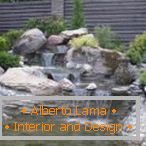
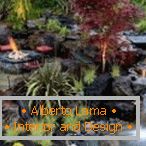
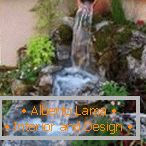
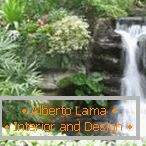
Form and types of cascades
Decorative waterfalls are divided into the following subspecies according to the nature of the design:
- A source. The water flows smoothly from the artificial "channel" into a small reservoir. Such fontanels are universal and suitable for creating quiet, cozy natural corners with unobtrusive murmur. The origins are often formed in the form of inverted jugs, cracked amphorae, sea shells.
- Simple, single-stage. This type has only one protrusion - a man-made barrier, which allows the water to flow beautifully along a wide "stripe". Typically, such structures are small. If the height of the ledge exceeds 1 m, then the pleasant murmur of the murmur will be replaced by an obsessive buzz which will bring to nothing the whole aesthetics of the decorative design. The width of the stretched water jet is regulated by the dimensions of the "step".
- Fountain waterfall. It creates a lot of noise, but it looks impressive. Such a structure requires a powerful pump that can maintain the required pressure.
- Multistage waterfall. It is shaped like a single-stage one, only with a large number of protrusions. The structure, as a rule, due to the steps is strongly stretched up, so it is more appropriate to look outdoors or in rooms with high ceilings.
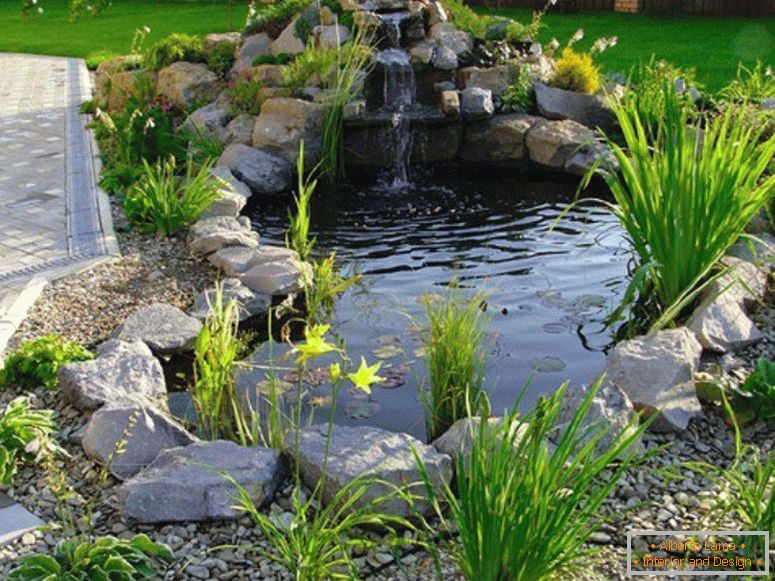
Forms of structures can be very different:
- Square;
- Rectangle;
- A semicircle where water flows either with a convex or concave side;
- Asymmetric compositions.

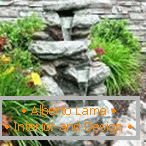
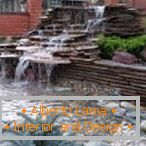

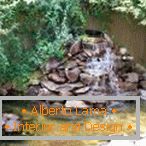
The latter are most like natural waterfalls, so they are used to create the most accurate imitation of a natural composition.
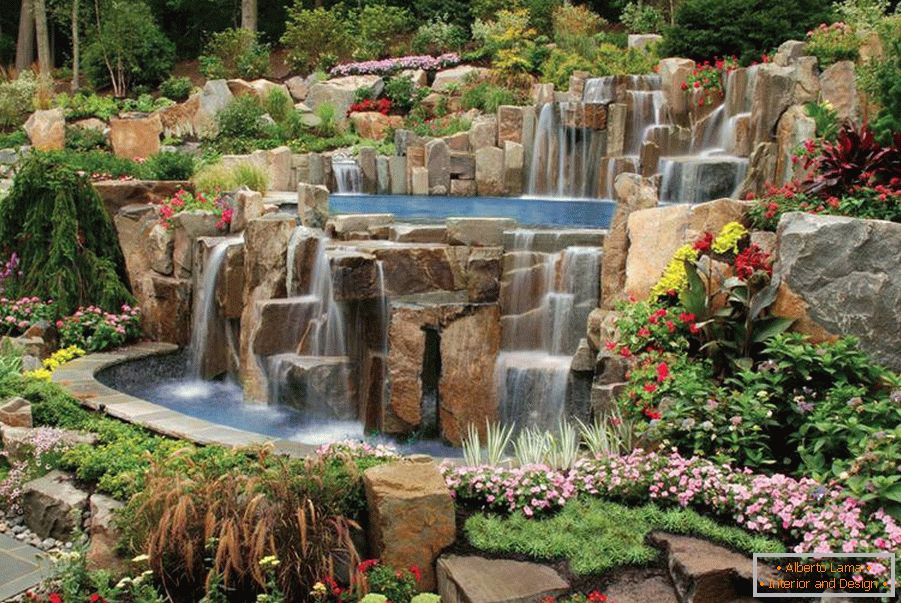
It is worth noting that even the smallest waterfall will regularly moisten the air. This is useful not only for indoor plants, but also for humans. Especially convenient is a natural humidifier in those houses where the capacity of the heating system is not manually regulated, and the air is too dry.
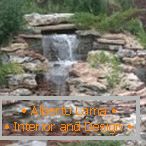
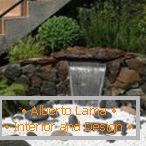
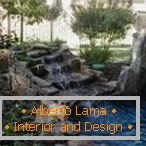
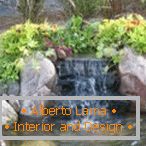
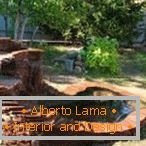
Select a location
From the choice of location depends not only the combination of a waterfall with an interior picture, but also the features of caring for it. If it is a question of construction on the street, then it should not be placed:
- Under the trees. In autumn, the falling leaf will cause a schedule for the care of the waterfall, as it will systematically clog it.
- In the far corners of the garden. Do not forget that such a luxurious decor is worthy of being visible, and accordingly it is necessary to place it on open areas.
- In places where there is no shadow. This advice applies only to complex combinations of waterfalls and ponds with livestock. Fish and plants are unlikely to have the taste of constant overheating.
- Near residential structures, the finish of which is made of materials sensitive to high humidity.

In the room you should not place waterfalls near the batteries. Under the taboo are rooms with "wet" walls, on which mold is periodically formed. A constant source of moisture, you only aggravate the situation and provide a ticket to life fungi and other organisms that are dangerous to humans. Small, floor waterfalls are located either in the center of large rooms, or somewhere in the "privacy corner" in small rooms. In the latter case, the central composition not only beautifies the interior, but also hinders the free movement of the owners, thereby violating their comfort. At the cottage ideal places for waterfalls are gazebos, centers of spacious yards, areas for games and recreation. To complete the composition of the next planted low bushes: roses, dog rose, viburnum, spiraea, hydrangea, hawthorn, lilac.
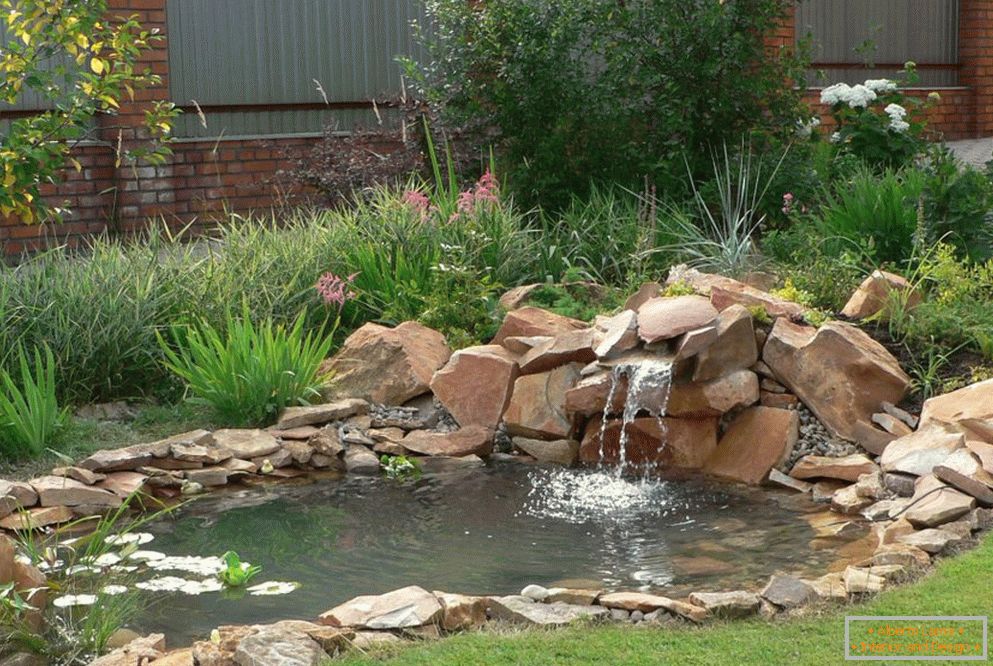
To save yourself from unnecessary hassles, choose a place with a natural slope of the soil so that the water drains off on its own, and you do not have to "help" it by adjusting the decorative surface accordingly.
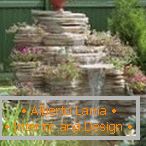
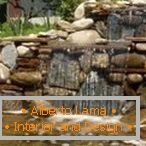
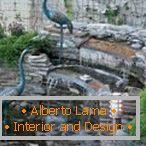
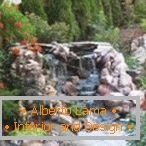
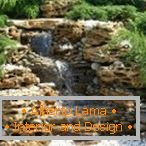
Optimal height of cascades
As for the altitude, it should not exceed 1-1.2 m. The optimum figure is 0.5-0.8 m. When falling from such a height, the stream creates a small noise curtain, which does not irritate. The main thing is that finding a waterfall would cause pleasant emotions, not only from contemplation, but also from listening to such "music of nature". If there are artificial obstacles in the water flowing areas, to create a foam spray, the noise level rises sharply, so the expediency of their placement is established by experience. The higher the "drop point" is located, the more powerful the pump is required, and this is associated with increased energy consumption and additional waste.
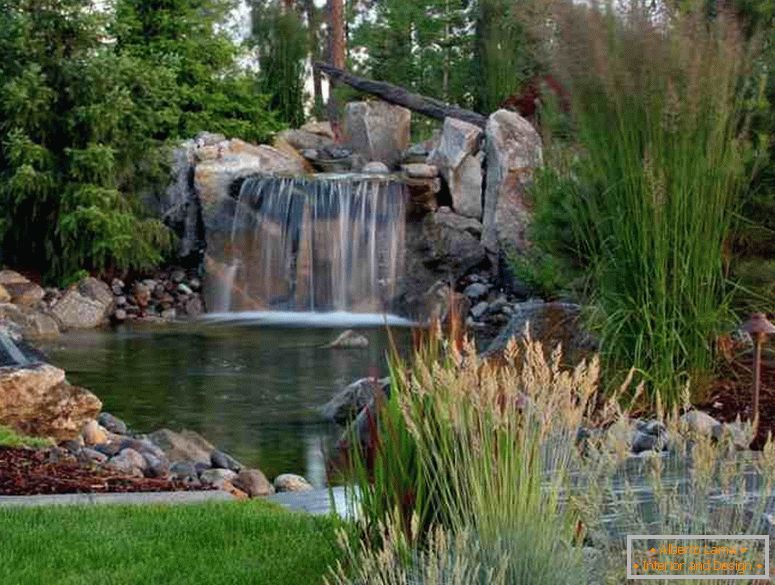
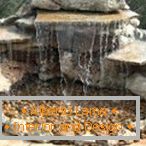
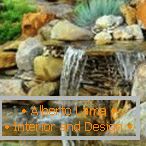
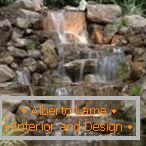
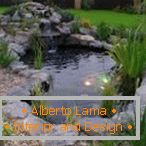
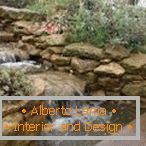
We make a waterfall with our own hands
Making a waterfall with your own hands is not so difficult. After the optimal location is chosen, it is necessary to connect the talents of the builder and dig a pit, equip it properly, install the pump. Then you will need the skills of a designer and maybe a bit of an architect to design a whole stylistic composition. In the final analysis, mini-construction is completed with the launch of water. We will discuss in more detail the features of the work at each stage.
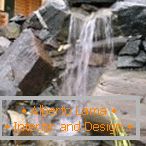
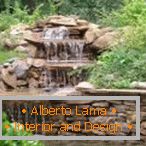
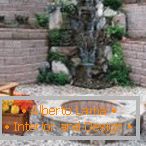
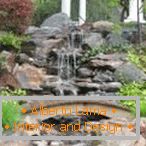
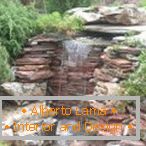
The pit
Before you start digging, you need to make a markup. For these purposes, use pegs and a strong thread, which is stretched between them. You define the width yourself, but for depth there are certain standards. If the pond adjacent to the waterfall is populated with underwater flora and fauna, then dig to 1.2-1.5 m. For an exclusively decorative option, a depth of 0.7-0.8 m will suffice. First, the place is cleaned of grass and unevenness . During the excavations, the edges of the pit are periodically wetted with water, thus preventing the walls from shedding. After the completion of the main works, sand and gravel are poured onto the bottom of the excavation up to 12-15 cm.
Read also: Decorative bridge for the garden +50 photo 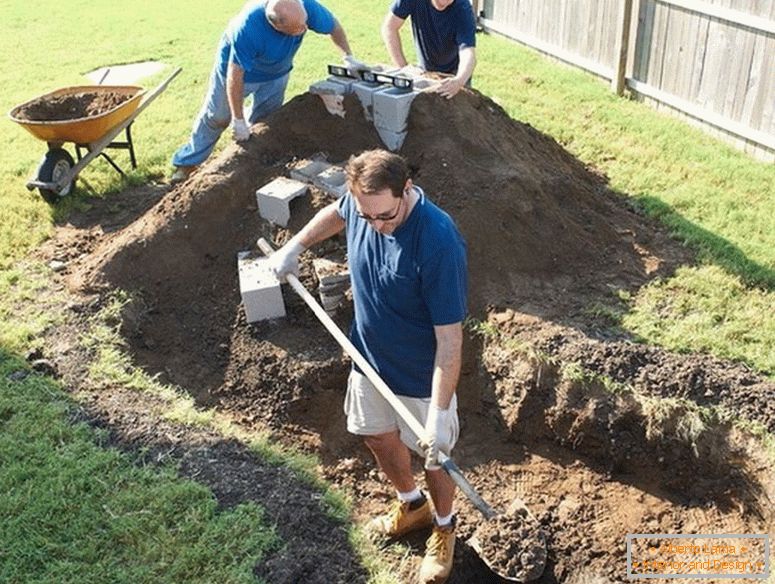
Waterproofing layer
With the type of waterproofing it is necessary to decide at the design stage. There are three main types:
- Flexible. For this method, a special film is used, which copes with the task, but does not keep the form, but only repeats it. Variants with an average cost are made from PVC. At the heart of a more expensive film is butyl rubber.
- Absolute waterproofing (concrete + stone). This is an old, time-tested, but very labor-intensive way. It is used in the construction of monumental structures for dozens of years, as it isolates what is called "tightly".
- Tough. Provides the use of a durable shape of plastic or composite.
The most popular flexible waterproofing. Its cost is not so biting, and the service life is quite "decent". It is worth noting that, the deeper the pit, the thicker the film is used for waterproofing. An example match table looks like this:
- Deeper than 1.5 m - from 1.5 cm;
- Up to 1.5 m - 1.1-1.2 cm;
- Less than 1 m - 0,7-0,8 cm.
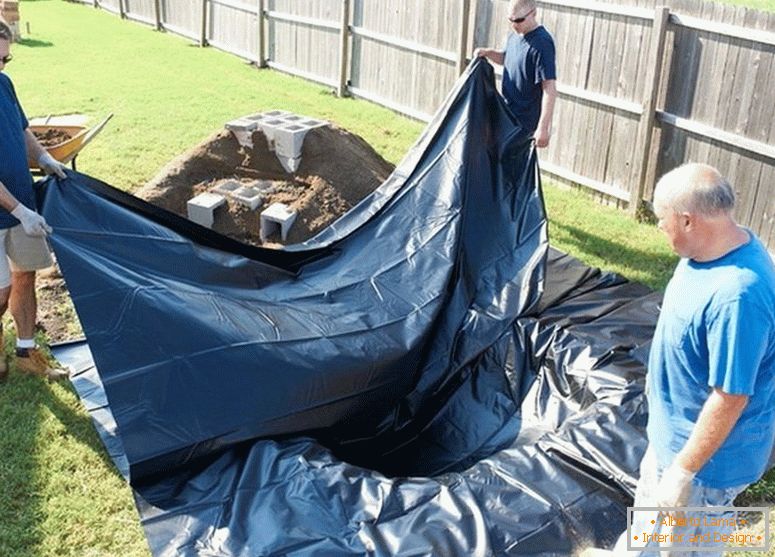
Rigid waterproofing is used to create large waterfalls. A similar element in cases with small structures can be done independently. Materials will only require fiberglass and plastic.
At a shallow depth of the pond adjacent to the waterfall, in the winter season, algae will be frozen to the layer of waterproofing. Before the first cooling they will have to be removed and placed for the entire season in a home aquarium.
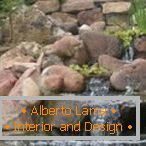
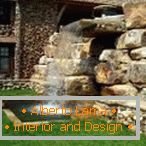
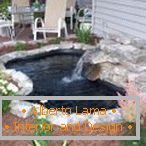
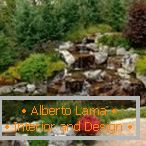
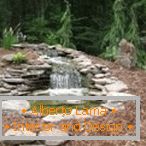
We form cascades
The waterfall is formed at a height difference. His creation in the construction will have to attend. To flow flowed smoothly along the steps, form protrusions. Water, as is known, grinds the stone, so among the variety of materials, sandstone is preferred. The pieces of this sedimentary rock look natural and easy to care for. However, a stone is a surface layer. The basis of the cascade is better to construct from a tree, simultaneously reinforcing it with concrete. After the drying of the structure, the pump is mounted and only then do they start decorating.
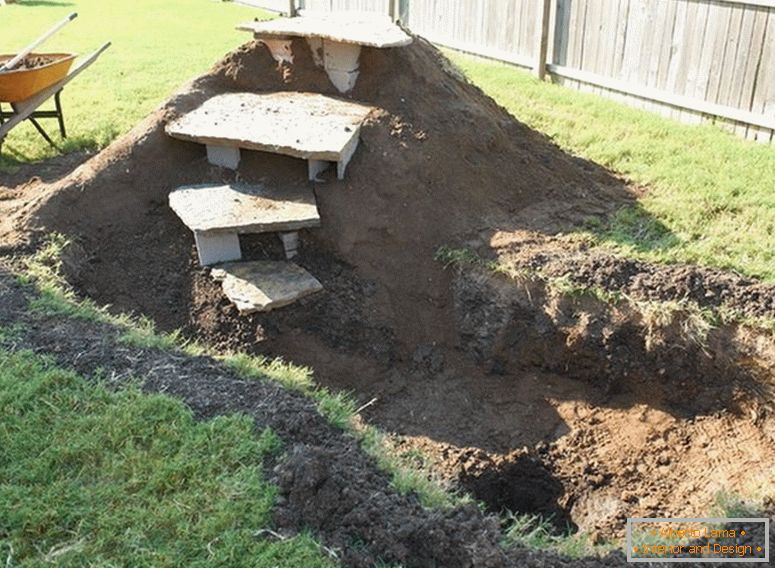
For those who do not want to deal with the formation of cascades themselves, in specialized stores they offer to purchase ready-made forms. All that is required: choose the appropriate size and install it in the foundation pit.
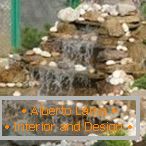
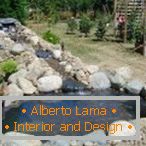
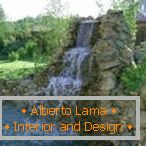
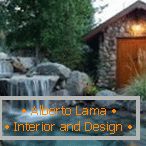
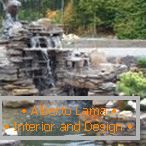
Pump mounting
Digging a foundation pit and constructing a foundation is only half the battle. The next task will be to provide the pond with water and its continuous circulation. Pumps come in two types:
- Surface (external). Used to create a closed loop in large structures. Located next to the tank.
- Submersible. Placed on the bottom of an artificial pond.
To create a waterfall flow of relatively low altitude (up to 1.2-1.5 m), it will be sufficient to have a 70W pump. The unit operates from the power grid, so the installation of the transformer is done ahead of time. The hoses are masked with a decor, and the pump is tried to close with algae. The whole system consists of filters, 2 hoses (one for ejection, and the second for suction), a cable and a "box" in which the motor is hidden. One pump "sleeve" is placed on the bottom of the tank, and the second is pulled to the point where the water falls.
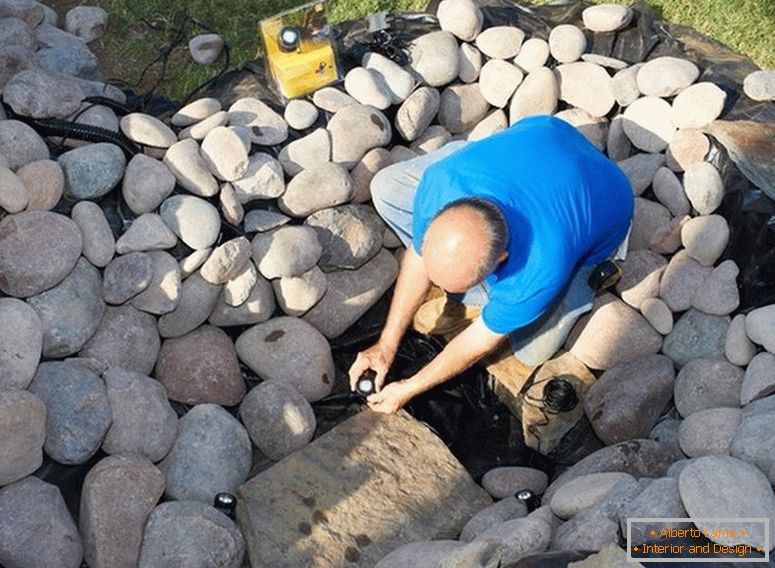
Decoration methods
As already mentioned above, the waterfall itself can be made with any kind of artificial and natural stone, but preference is given to sandstone, marble and granite. Of course, you can take any cobblestone on the road of a beautiful shape and use it to create a composition. Stones can lie freely. In this case, they are moved with time and change the design at will. Also, the construction can be cemented with cement mortar, which tightly mesh the monumental structure. For decoration use a wide variety of materials:
- Pebbles (pebble);
- Sand;
- Shells;
- Seaweed;
- Coins;
- Figures of frogs, snails and other aquatic creatures from ceramics.

All these decorative splendor fill the bottom of the tank to give it a natural texture. When choosing seaweed, be guided by those that feel great in a climate of local climate. The waterfall itself is covered with stones and their imitation. Naturalness to this "interior" is given by rare bunches of green, looking through the crevices. In more expensive versions, just under the cascade stages, the backlight is set. The wiring is insulated properly, and the lamps are chosen to be moisture resistant. It looks like this design is charming especially at night.
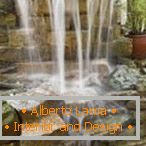
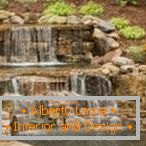
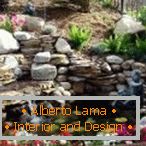
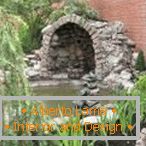
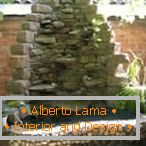
Plants for decoration
First of all, decorate the adjacent area, as the "edging" creates a panoramic view. Corner with bubbling water should be pacified and adjusted to a positive mood, so under your feet planted soft grass lawn. On such a surface it will be pleasant to walk barefoot. Around the artificial pond and waterfall, flowering shrubs are planted. The original idea will be the "Linnaeus watches", when each species reveals the petals of the buds at a specific time, and these periods do not overlap. So you will have an ever-flowering garden. Among bushes give preference to lovers of high humidity:
- Daylilies;
- Manniku;
- To the Strelolist;
- Irisam;
- Azorelle;
- To the saxifragers;
- Kaluznice;
- Ferns
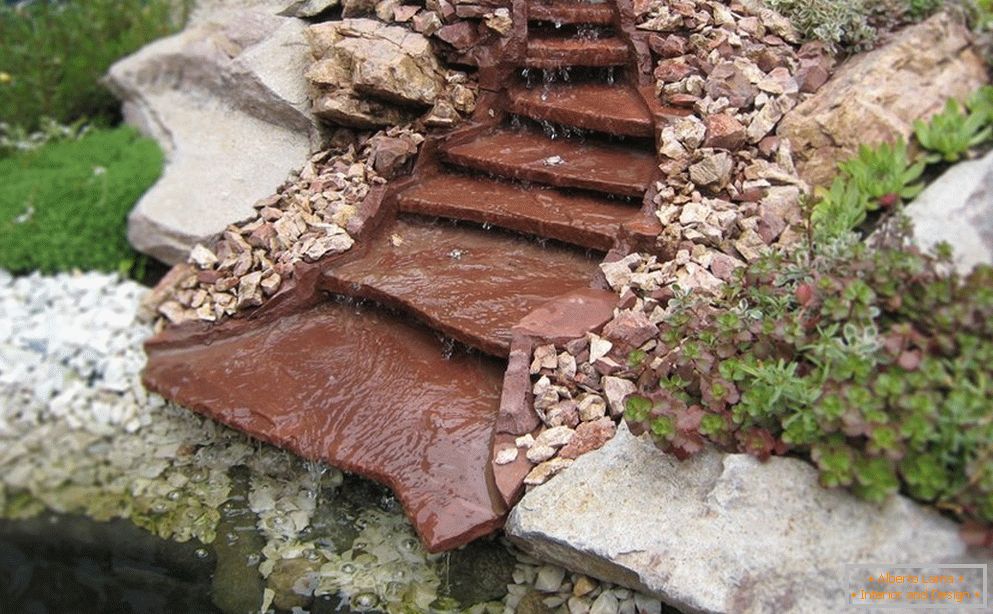
In addition, they plant a colorful reed, which is associated with quiet hills. If you decide to decorate the house with a waterfall, then the "nail" of the program is planted in potted plants. In the rooms, decorated in minimalism or with Japanese motifs, water structures in the frame of miniature bonsai trees look beautiful. Such an interior object is suitable for decorating a living room, conservatory or "corner of appeasement" in any other room. Decorating waterfalls also have styles. They are conventionally divided into three broad groups:
- Natural. The waterfall is trying to get as close as possible to the natural original.
- Ethnic. Clay pots, amphoras, ceramic tiles, an abundance of ornaments and patterns are often used here. The whole design creates an impression of man-made.
- Modern. They use the simplicity of shapes, straight lines and cold lighting. Water flowing in trickles along the glass (mirror type) is one of the brightest representatives of the style.
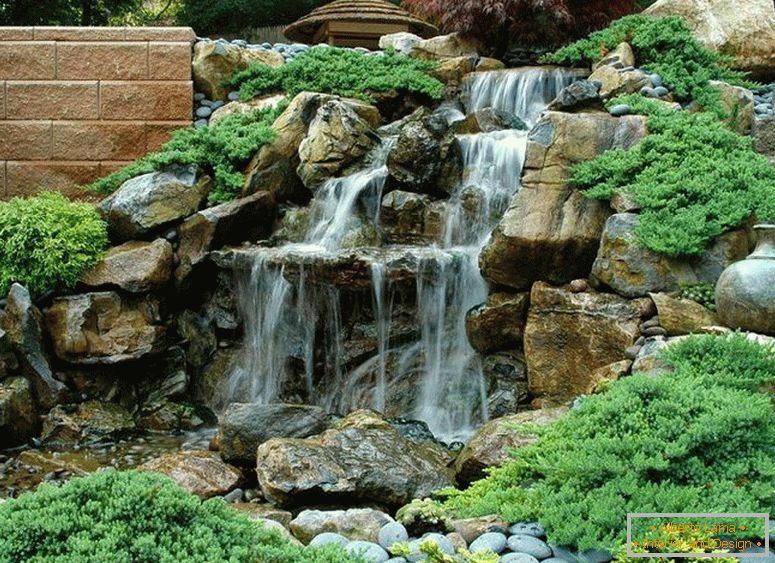
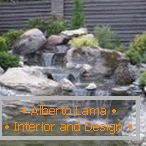
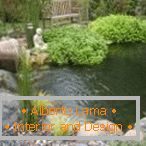
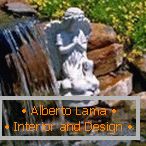
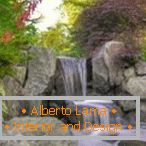
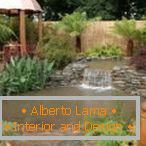
How to properly care for waterfalls
Approximately once a month, the water should be drained and filled with a new one. The bottom and walls of the tank together with the decor during drying are cleaned with napkins or soft brushes with a special tool. On particularly hot days, when a certain part of the water evaporates, it will have to be refilled, so that the waterfall "farm" does not become shallow. Do not forget about this procedure for those who are holding fish in the environment of algae. In the autumn periods, yellow leaves are removed from the surface of the water with a special net. Vigor should be periodically fed. For the winter, the water is pumped out, the tank is cleaned, dried and covered with a protective film. If you have a southern climate with warm winter, then this procedure can be abandoned.
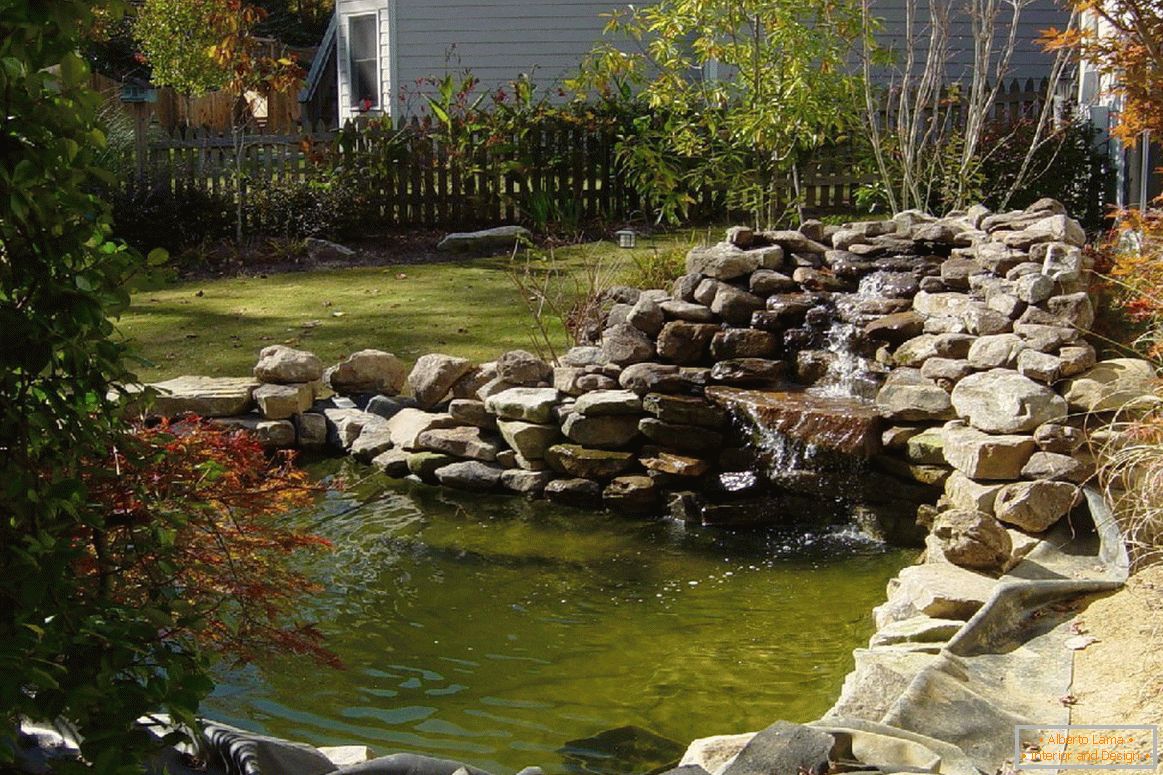
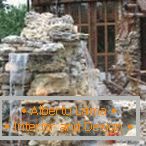

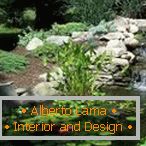
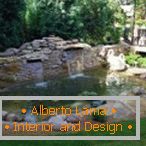
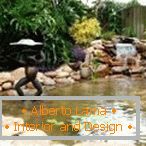
Conclusion
The construction of the waterfall is not an easy task, but with the availability of materials, tools and enthusiasm, its implementation will be a fascinating process. Decoration of the design can be thought up by yourself to make it unique, or to peep ready-made ideas on thematic resources. The maintenance of large waterfalls on a site, as a rule, is connected with additional expenses for an electricity, therefore before construction really estimate the possibilities. Otherwise, the finished structure will be idle for months and only a couple of days a year to please the owners. Significantly simplify the task for those who have a trickle or other natural body of water in the area. Having created the necessary bias, you simply will form a part of its coast and you can do without attraction of the pump.

